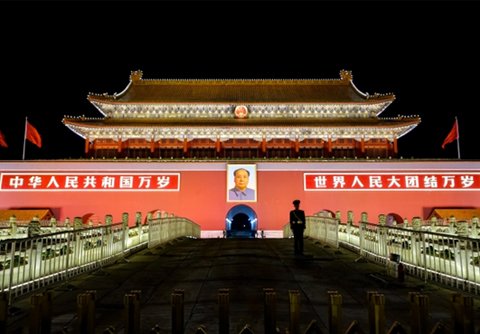WOULD A DEMOCRATIC CHINA BENEFIT THE INTERNATIONAL SYSTEM?
2022.12.08
In the past few days, some of China's major cities have been shaken by popular protests demanding the end of the government's zero COVID policy. Amidst the growing anger triggered by unending lockdowns and other restricting measures, some voices have gone so far as calling for Xi Jinping to step down, and asked for a greater degree of democracy and freedom.
Some observers have been quick to call the protests the most serious domestic challenge that the ruling Chinese Communist Party (CCP) has had to face since the Tiananmen massacre in 1989. Contrary to popular beliefs, social unrest is not uncommon in China. Tens of thousands of "mass group incidents" happen in China every year, and many are provoked by local issues such as forced land requisitions or labor conditions. However, nationwide protests targeted at central government policies remain a rare occurrence.
A DEMOCRATIC CHINA?
As the CCP first seemed to hesitate on how to respond to the protests and critics of Xi Jinping's regime are waiting for it to stumble, these calls for greater freedom have reignited discussions on China's democratization. The topic is as old as the world. Well, not quite... but it has been around for some time, ever since some segments of the Chinese society - especially the ruling class, the intelligentsia, and the merchants - became exposed to Western ideas in the 19th century. The idea of a Chinese democracy survived the Civil War and the victory of the CCP in 1949. Soon after, Mao Zedong proposed to implement his idea for a 'New Democracy.' Even today, some Chinese officials, such as former Chinese Foreign Ministry spokeswoman Hua Chunying, continue to argue that China is a real democracy because it is "people's democracy," while the US is merely a "money democracy."
That the CCP's idea of democracy radically differs from liberal democracies is beyond doubt, and the fact that Chinese continues to claim that its idea of democracy is 'more real' is irrelevant for the purpose of this discussion. What is relevant is the possibility that China's system of government may one day finally converge towards values that other liberal democracies may identify with. Among liberal democracies, this hypothesis is often viewed very positively. A liberal and democratic China would be respectful of the rule of law, human rights, and so on. Issues involving Hong Kong and Taiwan would be quickly resolved, as the need for the 'One Country Two Systems' would disappear. One important corollary to this hypothesis is that international tensions would diminish, and international cooperation would become far more likely.
THE DEMOCRATIC PEACE THEORY
No one can know with 100% certainty whether or not current protests will effectively lead to any form of liberalization or democratization in China, but these events provide us with a good opportunity to revisit the idea that a democratized China would lessen risks of conflict and diffuse tensions with some of its current competitors - the US and Japan included.
The democratic peace theory, whose latest iteration has been refined by Michael W. Doyle and other Liberal scholars, is an International Relations theory, which argues that democracies are reluctant to go to war against one another. Based on this logic, democratic countries should encourage non-democratic ones to engage in democratization in order to reduce the likelihood of inter-state conflict and stabilize the international system. This idea has underpinned to some extent the US discourses legitimizing their wars against Iraq and Afghanistan.
THE PITFALLS OF DEMOCRATIZATION
However, it has been known for some time that democratization is a notoriously difficult process, and that democratizing countries actually tend to act aggressively on the international scene.
Democratization refers to the introduction of democratic principles marking the transition to what we often call a 'liberal democracy.' Fully-fledged democracies with robust democratic institutions embracing liberalism are the product of complex historical processes. Such democracies are in fact rather rare and represent a minority among the 193 countries that make up the United Nations. Following decolonization and the collapse of the Soviet Union, a number of countries have embarked on democratization processes. While these processes are not fix and definitive, these countries have often fallen short of the mark and transformed into what Fareed Zakaria called 'illiberal democracies.' Examples of 'illiberal democracies' include post-1991 Russia, or Turkey under the Erdogan administration. Even in some of the more robust liberal democracies such as France or the United States, chronic episodes of populism, nepotism, and other political malpractices constantly undermine the foundations of democracy. For instance, the riots that occurred on January 6, 2021 in front of the US capitol in Washington DC attempted to disrupt American democracy and illustrate how liberal democracy is not a given but requires constant work and vigilance to be upheld.
The second point is that, before it reaches the state of liberal democracy - if it ever does - a state transitions through an extremely turbulent period of time during which heightened nationalism, xenophobia, and ultimately wars of aggressions are commonplace. Jack Snyder and Edward Mansfield have thoroughly investigated how the unique conditions of democratizing states create domestic political power vacuums that spark intense and unregulated competition. Vying for power, political contenders are encouraged to raise the specter of threats and resort to belligerent rhetoric in order to amass popular support. Additionally, the risk that territorial disputes, which represent the first cause of inter-state conflicts, escalate into full-blown wars notably increases.
Should China go down the path of democratization, it will eventually have to confront these challenges. Successful democratic transition is not beyond the bounds of possibility. In China's direct vicinity, the Republic of Korea and the Republic of China (Taiwan) both managed to get rid of their authoritarian regimes, with little systemic instability. Liberal democracy has also been successfully practiced on the mainland's periphery, notably in Hong Kong. On the other hand, the CCP has spent years cultivating irredentism - the idea of getting back a territory considered 'lost' to the nation - a phenomenon that is unlikely to go away any time soon, even if the CCP were to disappear tomorrow. Whether or not a democratizing China will be able to rein in on nationalism and bellicose sentiments remains to be seen.

NOHARA JUN JULIEN 講師
国際関係論、国際安全保障(シーパワー)






